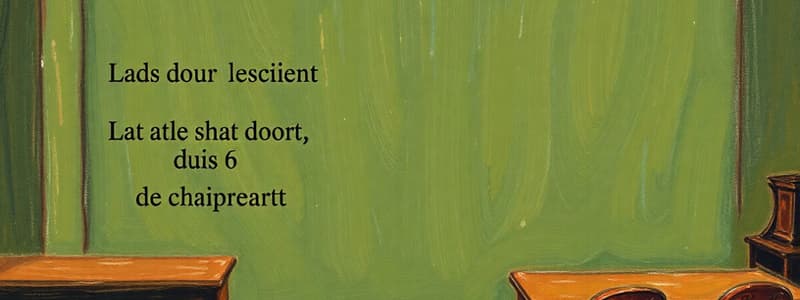Podcast
Questions and Answers
What is the French term for 'bicycle'?
What is the French term for 'bicycle'?
- la moto
- le taxi
- le tram
- le vélo (correct)
Which French verb means 'to travel'?
Which French verb means 'to travel'?
- voyager (correct)
- venir
- aller en
- aller
What is the correct form of 'aller' for 'they (female)'?
What is the correct form of 'aller' for 'they (female)'?
- Elles va
- Elles aller
- Elles vont (correct)
- Elle vont
Which preposition is generally used before modes of transportation that are feminine?
Which preposition is generally used before modes of transportation that are feminine?
In French, how is 'train' referred to?
In French, how is 'train' referred to?
What is the English translation of 'le transport ferroviaire'?
What is the English translation of 'le transport ferroviaire'?
Which of the following phrases means 'Excuse me' in French?
Which of the following phrases means 'Excuse me' in French?
Which phrase would you use to ask for permission to drink water in French?
Which phrase would you use to ask for permission to drink water in French?
Which mode of transport corresponds to 'le transport maritime'?
Which mode of transport corresponds to 'le transport maritime'?
How would you ask your teacher if you could go to the bathroom in French?
How would you ask your teacher if you could go to the bathroom in French?
What does 'debout (vous tous)' mean in English?
What does 'debout (vous tous)' mean in English?
Which phrase would you use if you need to ask how to say a word in French?
Which phrase would you use if you need to ask how to say a word in French?
What is indicated by the word 'la' in French transport vocabulary?
What is indicated by the word 'la' in French transport vocabulary?
Study Notes
Useful Phrases
- Common phrases to use in a classroom setting, including greetings, requests, and instructions.
- "Puis-je entrer?" means "May I come in?"
- "J'ai une question" means "I have a question"
- "Répétez, s’il vous plaît" means "Repeat, please"
- "Excusez-moi" means "Excuse me"
- "Je ne comprends pas" means "I don't understand"
- "Merci" means "Thank you"
- "Debout (vous tous)" means "Stand (all of you)"
- "Levez la main, s’il vous plaît" means "Raise your hand, please"
- "Asseyez-vous (vous tous)" means "Sit (all of you)"
- "Commencez (vous tous)" means "Begin (all of you)"
- " Arrêtez (vous tous)" means "Stop (all of you)"
- "Haut les mains" means "Hands up"
- "Haut la main" means "Hands down"
- "Chercher…" means "Search for…"
- "Comment dit-on… en français?" means "How does one say… in French?"
- "C’est ton tour - Vas-y" means "It’s your turn -Go ahead"
Means of Transport
- Four main modes of transport : road/land, sea, train, and air.
- "Le transport routier" means "by road/land"
- "Le transport maritime" means "by sea"
- "Le transport ferroviaire" means "by train"
- "Le transport aérien" means "by air."
- "La voiture" means "car" and is feminine.
- "Le train" means "train" and is masculine.
- “Le métro" means "subway" and is masculine.
- “Le tram” means "tramway" and is masculine.
- "L’autobus (m)/le bus" means "bus" and is masculine.
- "Le taxi" means "taxi" and is masculine.
- "L’avion" means "airplane" and is masculine.
- "L’hélicoptère (m)" means "helicopter" and is masculine
- "Le bateau" means "boat" and is masculine.
- "Le vélo" means "bicycle" and is masculine.
- "La moto" means "motorcycle" and is feminine.
- "Le tracteur" means "tractor" and is masculine.
- ”Le camion” means "truck" and is masculine.
- "La fusée" means "rocket" and is feminine.
- "Le cheval" means "horse" and is masculine
- “Le(s) pied(s)” means "foot/feet" and is masculine.
Prepositions "à" and "en"
- “à" and "en" are used with means of transport to indicate location.
Forms of the Verb “Aller”
- "Aller" means "to go."
- "Je vais" means "I go"
- "Tu vas" means "you go"
- "Elle va" means "she goes"
- "Il va" means "he goes"
- "Nous allons" means "we go"
- "Vous allez" means "you go" (plural and formal)
- “Elles vont” means "they go" (female)
- "Ils vont" means "they go" (male)
Forms of the Verb "Voyager"
- "Voyager" means "to travel."
- "Elle voyage" means "She travels"
- "Elles voyagent" means "They travel" (female)
Comparatives
- Common comparative words in French:
- “Plus… que” means "More… than"
- "Moins… que" means "Less… than"
- "Aussi … que" means "As… as"
Places of Interest
- Common words related to places of interest:
- “Le musée” means "the museum"
- "Le monument" means "the monument"
- "Le parc" means "the park"
- "La ville" means “the city”
- "Le château" means "the castle"
- “La montagne” means "the mountain"
- “Le lac” means “the lake”
- "La forêt" means "the forest"
- “L’océan " means "the ocean"
- "Le désert" means "the desert"
Studying That Suits You
Use AI to generate personalized quizzes and flashcards to suit your learning preferences.
Related Documents
Description
Test your knowledge of useful French phrases that can enhance your classroom experience. This quiz covers common greetings, requests, and instructions that students frequently use. Challenge yourself to translate and understand these essential phrases!




